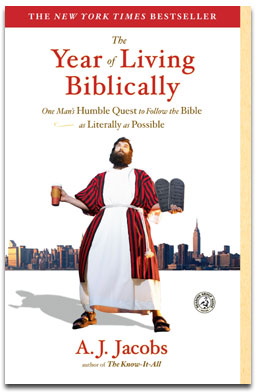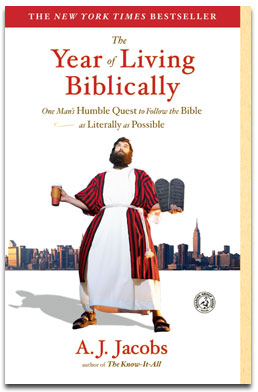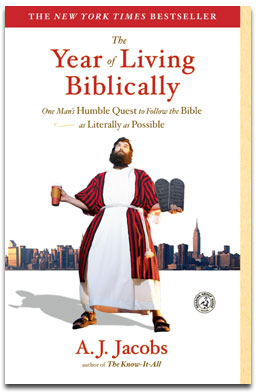 What would it be like to live out, as literally as possible, every command in the Bible -- including the command to stone adulterers and the one about not wearing garments with mixed fibers? Or, to never trim your beard. (Ladies, you can opt out of this one.) Well, my friend, you've come to the right place. A.J. Jacobs has written a very funny book, The Year of Living Biblically, about his attempt to live out those hundreds of commands as literally as possible, for one year.
What would it be like to live out, as literally as possible, every command in the Bible -- including the command to stone adulterers and the one about not wearing garments with mixed fibers? Or, to never trim your beard. (Ladies, you can opt out of this one.) Well, my friend, you've come to the right place. A.J. Jacobs has written a very funny book, The Year of Living Biblically, about his attempt to live out those hundreds of commands as literally as possible, for one year.
As I mentioned a few weeks ago, we're dividing this book into four chunks. Chunk one is this week. What I'm particularly after in our discussion is: What are the assumptions the author has about how a person becomes "good?" What is the point of being good? And, what is God really after?
Part One (First 3 months of Jacob's biblical year)
First off, what was your favorite anecdote from the first part of the book? I particularly enjoyed Jacob's hunt to pick up tips on the internet for blowing his new shofar ram's horn:
- "Separate the lips as if you were making a raspberry."
- "Keep your jaw in the position you would if you were spitting a watermelon seed."
- "If you do wet them [your lips] too much, spittle is best removed from the shofar by a coffee brush or an aquarium brush."
Good tips.
Preparing for his biblical year:
In preparation for his "biblical year," Jacobs said, "I type into my PowerBook every rule, every guideline, every suggestion, every nugget of advice I find in the Bible. When I finish, I have a very long list. It runs seventy-two pages. More than seven hundred rules." Jacobs does say that, obviously, not every rule in the Bible can be acted upon literally -- like gouging your eyes out if they offend you. Or the one about becoming a eunich for Christ. You'd lose a lot of body parts that way. Instead, he's looking for the original intent: "If the passage is unquestionably figurative -- and I'm going to say the eunich one is -- then I won't obey it literally. But if there's any doubt whatsoever... I will err on the side of being literal."
- As Jacobs pours over his list of over 700 "rules," he says, "But plenty of other rules [other than the common ones like no lying, love your parents, etc.] don't seem like they'll make me more righteous at all." (p. 8) What assumptions do you think are behind Jacob's statement here, or his biblical year project as a whole?
- So far, in the first quarter of the book, Jacobs contends that, although there are benefits of trying to live biblically, he still remains agnostic. In fact, one of his spiritual advisors, Robert, warns him, "You're going into this thinking that it's like studying the sumo wrestlers in Japan," Roger says, "You're saying to yourself, 'I won't really become one [a true follower]. I'll maintain my distance.'" (p. 36) What's the problem with Jacob's approach to living biblically?
- On page 15, Jacobs says, 'I can't do anything without fear I'm breaking a biblical law." And on page 17, "I was so busy obsessing over the rules..." Has there been a time in your journey with God that you felt captive to rule-keeping?
- Jacobs tells us his plan is in keeping with the theory of cognitive dissonance he learned about in college: "This says, in part, if you behave in a certain way, your beliefs will eventually change to conform to your behavior....If I act like I'm faithful and God loving for several months, then maybe I'll become faithful and God loving." (p.21) Do you think this approach works? Does it work at all?
The Year of Living Biblically - part one
 Monday, April 27, 2009 at 12:02PM
Monday, April 27, 2009 at 12:02PM  After a long delay (Sorry, I got distracted), we're moving on to months 4-6 in A.J. Jacob's "year of living biblically:"
After a long delay (Sorry, I got distracted), we're moving on to months 4-6 in A.J. Jacob's "year of living biblically:"



















